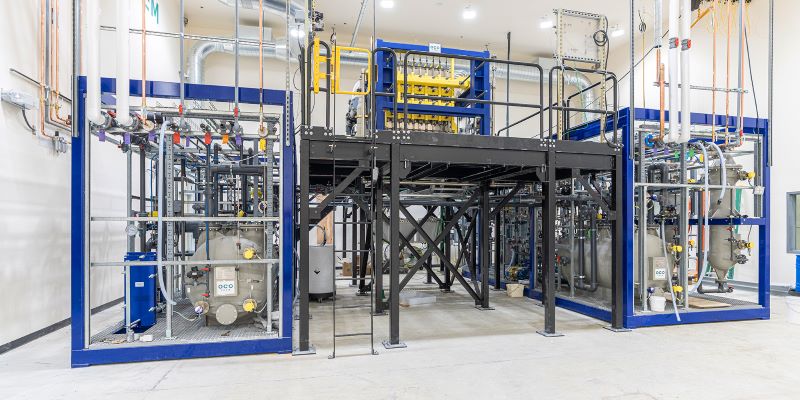Facility represents the first industrial-scale application of a CO2 Electrolysis process using commercial grade and size gas diffusion electrodes measuring 1.5m2 each in surface area

OCOchem recently announced the successful start-up and commissioning of the world’s first pilot plant to produce hydrogen formate and potassium formate at industrial scale using only carbon dioxide and water as feedstocks. The $5.0 million facility, capable of producing 60 tons of formate per year, represents the first industrial-scale application of a CO2 Electrolysis process using commercial grade and size gas diffusion electrodes measuring 1.5m2 each in surface area.
The new plant leverages a 4-cell stack of the world’s largest CO₂ electrolyzer cells —each measuring 1.5 square meters in gas diffusion electrode surface area —and operates at ambient temperature and pressure to produce formate with unprecedented energy and cost efficiency. Formate, a liquid organic molecule, is a versatile chemical used in agriculture, manufacturing, pharmaceuticals, cleaning products, metal processing and increasingly as a liquid carrier for hydrogen and carbon monoxide (syngas).
“For the last three centuries, humanity’s options to harvest useful carbon molecules have been limited to two: either grow it in the form of vegetation taking months or mine it from the earth in the form of hydrocarbons which takes millennia. We now have a 3rd way, CO2 Electrolysis, to directly and instantly synthesize organic molecules from CO2 and water. This artificial photosynthesis approach – using industrial-scale components – substantially reduces technology risk. And it allows us to accelerate our scale-out commercialization efforts at larger plant with thousands of cells,” said Todd Brix, CEO of OCOchem. “We’re proud to be the first to bring it to life at an industrial scale—unlocking a new third pathway to organic molecule manufacturing without relying on fossil fuels or biomass.”
Adds Brix: “In the world we see moving forward, the new platform molecules, the precursor molecules from which all other organic molecules are made, will increasingly start and be made from the molecules that can be made from CO2 at a lower cost than the incumbent fossil fuel-derived feedstocks. That means a C1 molecule, and that means a 2-electron molecule. Of all the carbon molecules that can be made from CO2, only hydrogen formate (also known as formic acid) can meet this standard with today’s energy cost.”
Subscribe to our newsletter & stay updated.